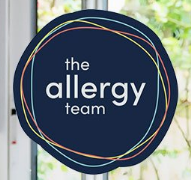Today, The Allergy Team in partnership with Benedict Blythe Foundation and ISBA (Independent Schools’ Bursar Association) launched the Schools Allergy Code. The Code sets out a clear framework for schools to follow to improve safety and inclusion for pupils with allergies.
I often talk about how allergy is the most common chronic condition in childhood. How 1 or 2 children in each class has a food allergy. How no other chronic condition can take a child from perfectly well to fighting for their life in moments. And how a child with allergies is twice is likely to be bullied than a child without.
But I just want to take a moment to talk about what this means to me.
As a lot of you will know, I am the mother of Will and Freddie who both have food allergies. Will first had anaphylaxis to milk when he was less than 6 months old. He went floppy, he struggled to breathe. It changed our life.
When a trace of an everyday food like milk or egg has the potential to harm, your perspective completely changes. Suddenly I couldn’t cook with staples, food shopping became arduous, expensive and scary. Going to friends or family’s houses for a meal involved lengthy conversations (and sometimes me rifling through bins for ingredient wrappers).
When we started looking for a school for Will his allergies were a huge part of our decision making process. The first school we saw offered him a preschool place, but then revoked it when they learned of his allergies. The second asked him to bring a packed lunch. The third welcomed him with open arms and he ate a school lunch alongside his peers.
It’s this discrepancy in schools’ understanding of allergy and their approach to managing it that makes parents feel so vulnerable and that I hope the Schools Allergy Code will help.
Working at The Allergy Team I hear from families across the country repeat similar stories to mine. Tales of amazing schools who have lots of things in place to support pupils with allergies, and who tailor activities and procedures to the needs of their individual pupils. But then horror stories – multiple allergic reactions, children being hospitalised after careless errors, pupils being excluded from school trips or being asked to sit in the library during particular lessons.
What the Schools Allergy Code gives is a set of standards, some clear guidance on how to manage allergies.
Last night a woman with a child with allergies (who also happens to be a teacher) messaged me and said “Initiatives like this make me feel that my child will hopefully be much safer in the years to come.”
This means so much to me, because it’s how I feel too.
If you work with schools, or know people who work with schools, or have a child who goes to school, please forward this message on. Our hope is that all schools will adopt this Code.
Read the schools allergy code here.


